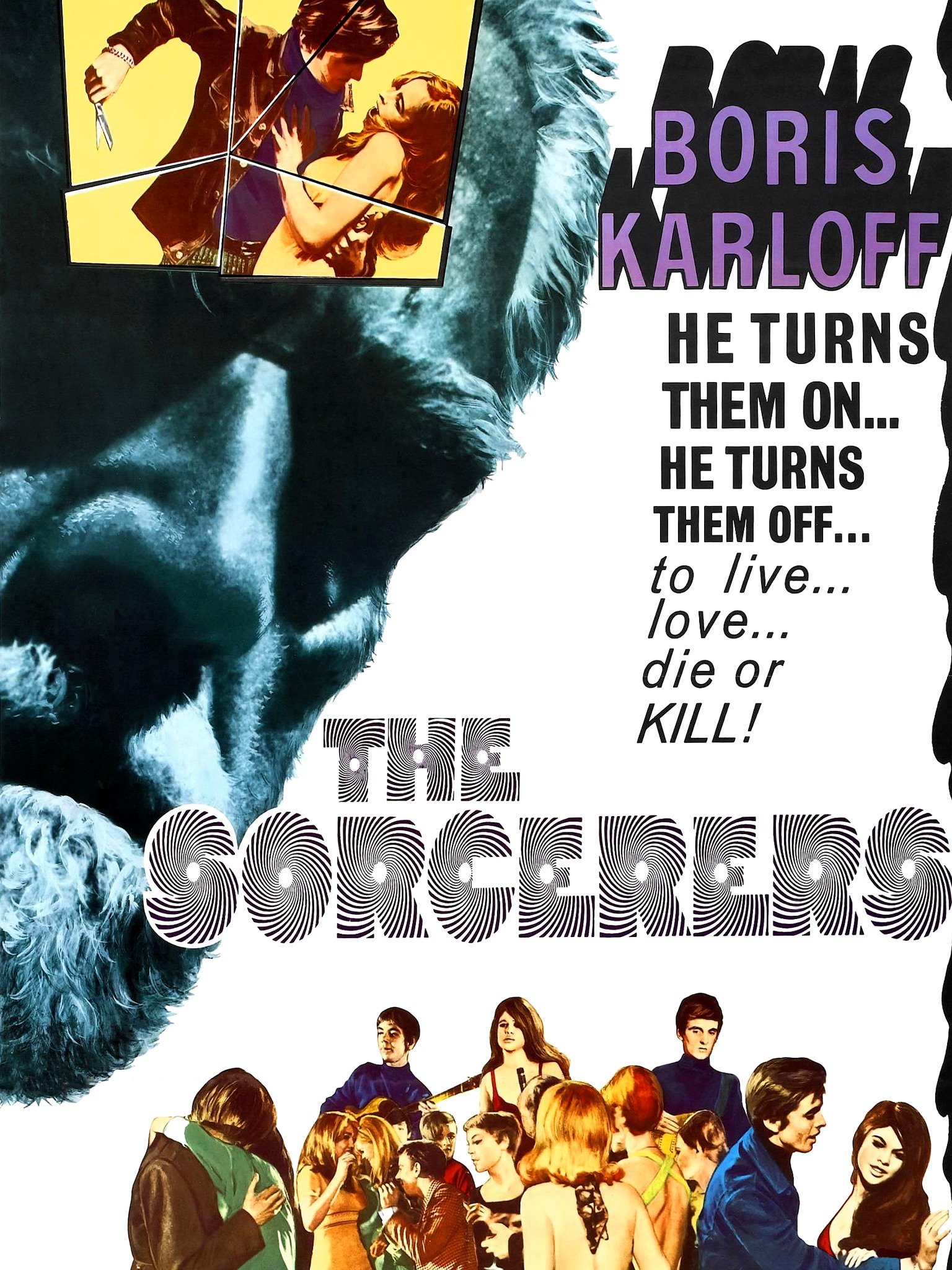
THE SORCERERS
(director/writer: Michael Reeves; screenwriters: Tom Baker/from a novel by John Burke; cinematographer: Stanley Long; editor: David Woodward; music: Paul Ferris; cast: Boris Karloff (Professor Monserrat), Catherine Lacey (Estelle Monserrat), Ian Ogilvy (Mike Roscoe), Elizabeth Ercy (Nicole), Victor Henry (Alan), Susan George (Audrey), Dani Sheridan (Laura), Ivor Dean (Inspector Matalon), Meier Tzelniker (Snack Bar Owner), Martin Terry (Tobacconist), Alf Joint (Ron, foreman mechanic), Bill Barnsley (Constable in Fur Store); Runtime: 87; MPAA Rating: NR; producers: Patrick Curtis/Tony Tenser; Warner Bros. Archive Collection; 1967-UK)
“A gem that has gone under the radar and deserves more attention.”
Reviewed by Dennis Schwartz
British filmmaker Michael Reeves (“Witchfinder General”/”Revenge of the Blood Beast”) made his first feature film, Revenge of the Blood Beast, at the age of 23. His untimely death in 1969, due to an overdose of barbiturates, cut short a promising career, after making only three films, with his last one “Witchfinder General” considered by many as his masterpiece. The Sorcerers is an unusual psychedelic horror pic that impresses as a dazzling original conceptual work with ambitions to say something worthwhile about the establishment’s mind-control over the puppet-like public. It’s a gem that has gone under the radar and deserves more attention. It also gains from having Boris Karloff play a role that was made to order for cinema’s most famous monster. Reeves’ theme is that there is no force in the world to counteract evil, that evil continues to proliferate until it gets consumed in its misdeeds. The screenplay is co-written by Reeves and Tom Baker, who adapted the film from a John Burke novel.
The aging Professor Monserrat (Boris Karloff) is a medical hypnotist, whose reputation was falsely defiled by the newspapers. For the last 30 years he has lived in poverty, obscurity, and without academic recognition with his long-suffering assistant wife Estelle (Catherine Lacey). They live in a dinghy London flat, and he’s eager to show with his latest experiment that those who mocked him were wrong. The nutty professor has invented a contraption that enables himself and his wife to not only control the mind of another person but for both to experience vicariously the sensations their subject feels. All that’s needed is a human guinea pig to see if and how it works.
The professor prowls the night streets of his neighborhood and recruits a hunky, angry, moody, bored swinger, Mike Roscoe (Ian Ogilvy), who stopped off at a snack-bar. The mad scientist promises the jaded youth a once in a lifetime experience of abandonment and ecstasy. The feckless Mike, an aged twenty-something clerk in an antiques shop, gets strapped into the electric chair contraption,psychedelic lights shine in his face and electronic rock music is played. When the experiment is concluded, the elderly couple release him and he’s told to forget about this experience. Both experimenters are thrilled to experience his sensations after they induce Mike to go for a midnight indoor swim with his French girlfriend Nicole (Elizabeth Ercy). The idealist professor views it as a boon to science, while Estelle gets overcome with greed and uses Mike for riskier deeds; such as, to steal for her an expensive fur coat in a store window and go speeding on a motorcycle he borrowed without permission from his mechanic friend Alan (Victor Henry). When Estelle realizes her will power is stronger than her husband’s, it becomes a battle of wills to see who gets their way with Mike. Estelle becomes giddy with power and opts for getting her thrills by having Mike viciously beat up Alan for talking back to him when he returns the damaged motorcycle, and then she raises the ante in thrills and induces Mike to murder a few women. The anguished professor can’t stop her evil perversity, but realizes if their subject dies in a violent way the couple will also experience that, and therefore when the police are chasing Mike the professor uses his will power to cause a crash and the car goes into flames. The couple’s charred bodies are seen lying on the floor of their apartment.
Some think Reeves meant for the film to be a metaphor for the cinema to be a vicarious experience for the viewer with his favorite actors he idolizes, while others see it as how we live in a materialistic age and our worst impulses are constantly craving for things with no end in sight. Still others took it as a depiction of the moral breakdown in society by the youths, who live only for cheap thrills and for their pleasures.
Whatever the film’s theme might be, its story brings an intelligence to the horror pic rarely seen in this genre.
REVIEWED ON 12/28/2012 GRADE: A